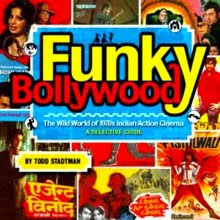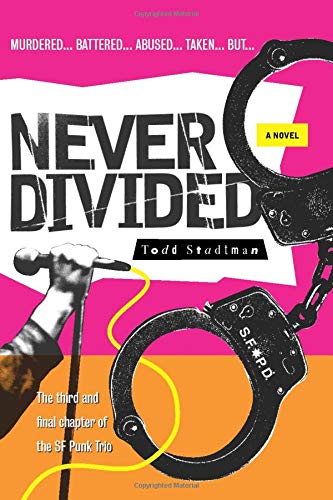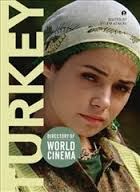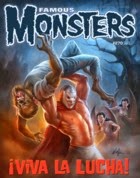Thanks in large part to the Italians, the rules of the movie western were as loose as they would ever be during the late 60s and 70s. So why not a film like
Las Tres Magnificas, in which a beleaguered frontier town finds salvation in the form of a trio of pantless chorus girls turned vigilantes? Of course, such burlesque set ups were typical of the good naturedly horny Mexican pop cinema of the era, especially when an eye popping "usual suspect" like the beautiful B movie starlet Maura Monti was involved.
Las Tres Magnificas was Monti’s second to last feature film -- the last being 1971’s
The Incredible Invasion with Boris Karloff -- and followed right on the heels of the wonderful
Cazadores de Espias. Some of Monti’s co-stars from
Cazadores are also here, including Eleazar “Chelelo” Garcia, who, true to the Mexican pop cinema rule of quotation marks, is known mostly for his comedic turns. The fact that Garcia’s character is the closest thing that
Las Tres Magnificas has to a villain speaks adroitly to the film’s lightweight nature.
Here Garcia plays bumbling bandit Felipe Mendoza, who, along with his two gun slinging sons -- Clemente, who dresses all in white, and Modesto, who dresses all in black -- poses an ongoing nuisance to the people of
Las Tres Magnificas’ subject town. It should be noted that, while both sons are portrayed as every bit as oafish as their dad, they are in fact played by a pair of bona fide Mexican matinee idols;
Latigo himself, Juan Miranda, in the instance of Clemente and Dominican sex symbol Andres Garcia in that of Modesto. In any case, seeing as this particular town comes with the usual combination of timid sheriff and passive -- indeed almost invisible but for the habitués of the saloon -- populace, the local padre has no choice but to seek help from outside.
This he finds in the much touted form of the titular Magnificas, whom he comes across in all their frilly knickered glory during one of their beer hall song and dance numbers. In contrast to Monti, who plays Candida, the remaining Magnificas are played by a pair of actresses who might be less familiar to Mexican genre movie fans. Where we might expect to see, say, Lorena Velazquez or Amedee Chabot, we instead have famous ranchera singer and actress Lucha Villa as Paz and former pageant winner and
future soft pop singer Renata Seydel as the blonde Dulce. From this point on, much comedic hay is made of the irony of this bawdy trio taking their marching orders from a man of the cloth, with the Magnificas at one point even masquerading cheekily as choirgirls.
Because of its cast and concept, I had hopes that
Las Tres Magnificas would be sort of a western version of one of the
Las Tigressas movies. That hope, however, was in vain. More of a comedy than an action film,
Magnificas, rather than endowing its heroines with Emma Peel-like martial skills, focuses instead on the havoc they cause just by being women. As such, the pastor has them hit the town disguised as a trio of virginal belles of the prairie, their garters and frilly intimates amply concealed beneath layers of bustles and petticoats. From there they proceed to seduce and then systematically humiliate the three Mendozas, leading to jealous squabbling among the gang that conveniently undermines their capacity to commit further crimes.
This is not to say, of course, that
Magnificas, being, after all, a western, is completely bereft of action. In one scene, the Magnificas fend off attacking Indians with a cannon mounted in their stagecoach, a pulpy touch that reminded me of the Spaghetti Western’s vision of a frontier littered with abandoned military armaments just there for the taking by any Django or Sartana who happens by. In another scene, the girls masquerade (they do a lot of masquerading) as Indians to attack the Mendozas with bows and arrows. Unfortunately, true to the film’s slapstick nature, this scene includes a bit where an arrow, missing its target, ends up striking a painting of a cow. When that arrow, lodged in the cow’s udder, is pulled out, a stream of milk issues from the painting. Oh my sides!
Given it has at its disposal the highly regarded singing talents of Lucha Villa,
Las Tres Magnificas is also something of a musical, with the star being given ample opportunities to belt out throaty ranchera numbers. Even Juan Miranda is given the chance to pluck out a romantic ballad and, later on, joins with the two Garcias in a comic moonlight serenade of the three female stars, who reward them by dumping multiple buckets of water on their heads. All of these melodic interludes, composed by award winning music director Manuel Esperon (a contributor to the score for Disney’s
The Three Cabelleros, among others) are pleasant enough, with by far the most catchy being the Tres Magnificas’ theme song, which the stars sing both upon their entrance and departure from the film.
Taken as a whole,
Las Tres Magnificas is a pretty pure example of “kitchen sink” 1960s/70s Mexican pop cinema, featuring as it does a bit of comedy, a bit of action, some song and dance, some beefcake and, for Dad, frequent occasion for the Magnificas to be seen lounging about in their complicated preindustrial underwear. And it is at this point in the review that I would normally say something like, “and that’s good enough for me” (accompanied, you might imagine, by the sound of me expectorating and the ring of a spittoon), but the fact is that I could have just as easily taken a pass on this one. Shocking, I know, but, while it has its charms, I see this as one more suited to the completists among you. Of course, that also depends on what you are completing; if it is your viewing of every film starring Maura Monti, then you are indeed engaged in one of life’s most admirable pursuits. If it is the viewing of every film in which a comical barroom brawl is accompanied by cartoon sound effects, then hell is too good for you.
[Note that the version of Las Tres Magnificas I watched lacked English subtitles, which, given the simplicity of the film’s story, caused me little regret other than that I was unable to determine whether it passed the Bechdel Test.]





























































No comments:
Post a Comment